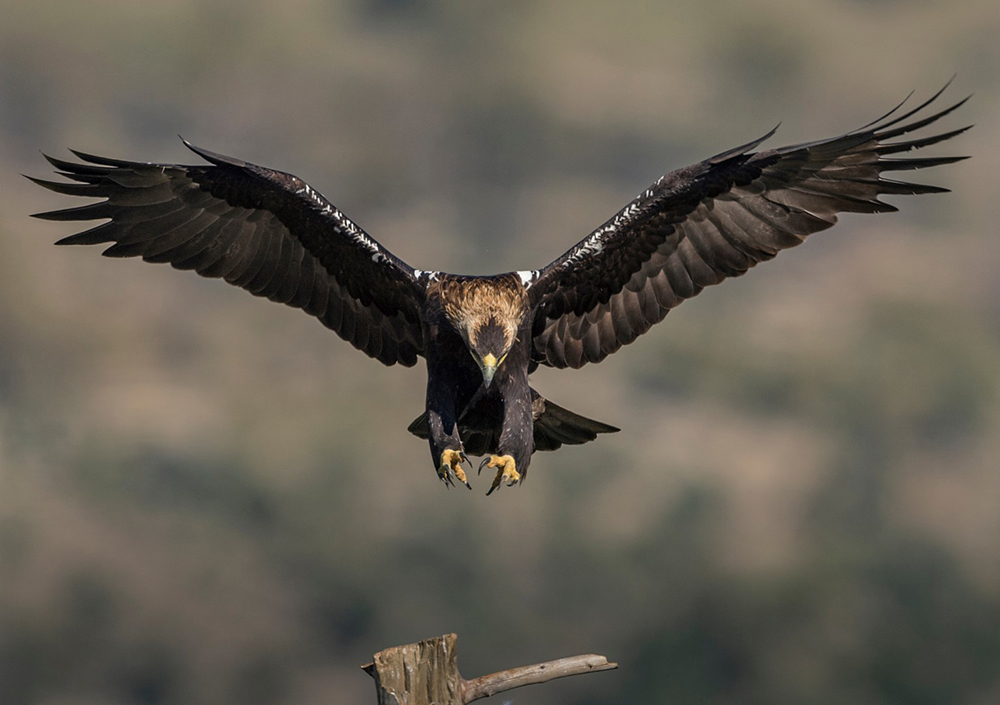 The year 2016 started badly for the conservation of the Iberian Imperial Eagle in Portugal, with the death of a potentially breeding bird in the municipality of Mértola, in the lowlands of Baixo Alentejo.
The year 2016 started badly for the conservation of the Iberian Imperial Eagle in Portugal, with the death of a potentially breeding bird in the municipality of Mértola, in the lowlands of Baixo Alentejo.
This species is among the rarest birds of prey in the world, it is one of the most threatened species in Europe and in Portugal it is classified with the status of “critically endangered”.
On January 4, a technician from the Institute for the Conservation of Nature and Forests (ICNF) found the corpse of an Imperial Eagle under a stone pine where the species had previously nested. This presented evidence compatible with a possible poisoning.
The SEPNA (Nature Protection Service) of the GNR was called to the scene, having collected the corpse and proceeded with searches and collection of evidence. The searches were carried out with the support of one of the GNR's cynotechnic teams for the detection of poisons, created under the LIFE Imperial Project, coordinated by the League for the Protection of Nature (LPN). The corpse and the evidence collected were now sent for necropsy and forensic analysis.
The specimen was found during the searches to locate another Imperial Eagle that is being monitored under the LIFE Imperial Project's remote GPS tracking program and that was not broadcasting for a few days.
It was in this region that, at the beginning of 2015, a poisoned Iberian Lynx died and there was also the death of an adult and an immature Imperial Eagle by poisoning (2013 and 2015, respectively).
In the region, many cases of mortality of various species due to possible poisoning have been detected, with the LPN team only detecting four possible cases last December (Kar Kite and Red-winged Eagle), and to which they were given due follow-up, with the results being awaited.
These facts, according to the League for the Protection of Nature, "reinforce the importance of the role of Project LIFE Imperial in combating threats to the species, in this case the use of poison."
The LIFE Imperial Project and its partners are committed to the fight against the use of poison, through the implementation of a training, awareness, inspection and legal action program.
The use of poison, common in the Iberian Peninsula, is already considered one of the main causes of unnatural mortality of the Iberian Imperial Eagle in Spain.
In Portugal, the real effect of the illegal use of poisons is still unknown, but the identified cases indicate a high and widespread illegal use of toxics.
The ease of acquisition of the venom and its application, as well as the number of individuals that it can eliminate and its low selectivity, make this problem one of the biggest current threats to the conservation of several species, namely the Iberian Imperial Eagle.
The use of poison in nature is also a serious threat to public health and domestic animals.
The Iberian Imperial Eagle (Aquila Adalberti)
Currently it nests exclusively in the Iberian Peninsula. The species suffered a great decline that culminated in the disappearance of the breeding population in Portugal, between the late 1970s and early 1980s.
It was only in 2003 that a breeding pair was confirmed again and, since then, they have been slowly colonizing the national territory, presenting the conservation status of “Critically in Danger”.
In 2015, the national population was 13 couples, divided into the regions of Beira Baixa, Alto Alentejo and Baixo Alentejo.
The LIFE Imperial Project
The LIFE Imperial Project (LIFE13/NAT/PT/001300) is a project coordinated by LPN and has eight national and Spanish associated beneficiaries, being 75% financed by EU funds from the LIFE Program of the European Union.
LIFE Imperial aims to ensure an increase in the population of the Imperial Eagle in Portugal, and consequently in the global Iberian population, through the reduction of threats that affect the effective establishment of couples in Portugal, guiding its actions to ensure that the natural return of the species to Portugal can be consolidated in a sustainable and lasting way.


















Comments